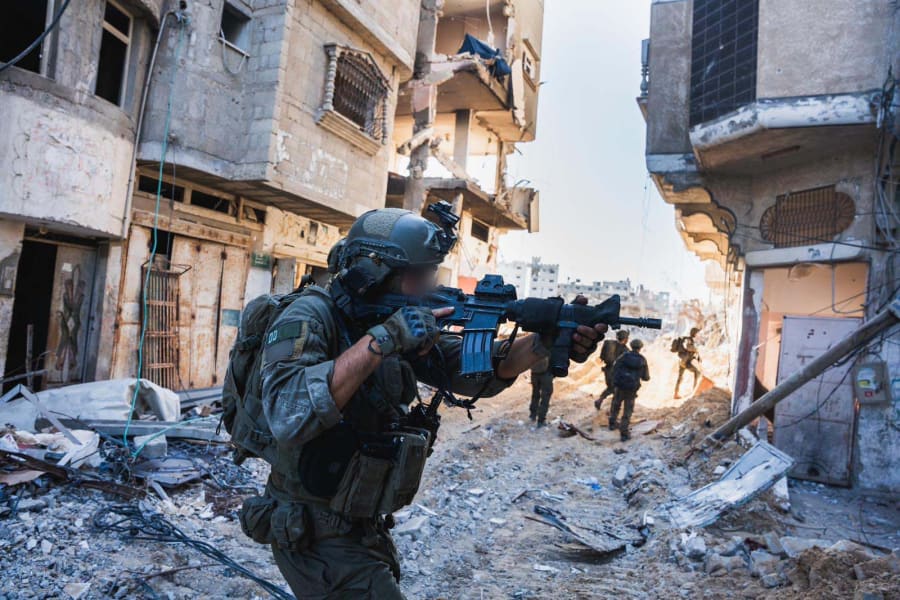‘The existential nerve of the Jewish people was touched’ – Netanyahu confidant lays out Israel’s view of war in Gaza
Strategic affairs minister vows not even US pressure will prevent Israel's victory

Israeli Strategic Affairs Minister Ron Dermer gave a detailed summary of Israel’s view on the war in Gaza recently during an interview with Dan Senor's Call Me Back podcast. He also assessed Israel's progress in achieving the war objectives thus far.
The interview with Dermer, one of Netanyahu’s closest advisors for the past decades, came just before his scheduled visit to Washington that was canceled by Prime Minister Benjamin Netanyahu at the last minute in response to the U.S. decision not to veto the recent UN Security Council resolution demanding a ceasefire in the Gaza war.
Shortly after the war began, Israel’s leadership declared that its goals were the dismantling of Hamas’ military and governmental capabilities and the return of the hostages that were kidnapped from Israel during the Oct. 7 terror attack.
Before the recent breakdown of the hostage negotiations between Israel and Hamas, Dermer said the talks were “very complicated,” as Israel was not only dealing with three mediators but also with two different branches of Hamas – inside and outside the Gaza Strip – with prolonged communication delays between them.
“And the person who’s most relevant here in the negotiations is somebody who's not around the negotiating table, but who’s stuck in a hole somewhere or deep underground in a tunnel in Gaza, which is Sinwar, who ultimately will make the decision,” Dermer told Senor.
Dermer spoke at length about the IDF's goal of dismantling Hamas’ capabilities, noting that the fatalities among Israeli soldiers during the ground incursion into Gaza, which total 253, were significantly lower than initially anticipated.
He said that an American official told him: “You can't destroy an idea,” and Dermer replied Israel was “well along the path.”
“The power of an idea, combined with an army and territory that they can control to lethal effect, is night and day,” he said.
“So the goal, when we talk about dismantling the military capability of Hamas… is not killing every Hamas terrorist in Gaza,” but the destruction of the Hamas “army of terror,” the minister explained.

This militant group, he continued, numbered about 30,000 Hamas gunmen and 5,000 -10,000 Palestinian Islamic Jihad (PIJ) terrorists on Oct. 7, organized into 24 regional battalions.
“Nineteen of the battalions have basically been defeated, maybe 18.5. It leaves around five, five and a half battalions, four of those battalions are in Rafah… under normal times, those battalions probably have around a thousand people.” Now, they probably doubled in size, Dermer said.
Defeating those battalions doesn’t require eliminating every last gunman, he explained. “It means that 50% of that force is either killed or wounded so the command structure is broken.”
Dermer described the situation in northern Gaza, where battalions have been dismantled but a low-level insurgency continues to simmer.
“So let’s say 6,000 were either killed or wounded. You still have 4,000 people running around there, but they’re not running around in the same structured way.”
“The best estimate is – we have killed between 11 and 12,000 terrorists in Gaza,” Dermer continued. In addition, about 1,300 terrorists were killed on Oct. 7.
“So that’s like 12,300. Then you have about another 2,000 that have been captured. So roughly you’re probably between 14 and 15,000 that have actually been killed or captured.”
The task of calculating the number of fatalities is complicated by the high number of terrorists who were eliminated in airstrikes while hiding underground, making precise figures difficult to ascertain.
Dermer added that roughly the same number of terrorists have been wounded in a way that will prevent them from continuing to fight.
“That means of that force, of 40,000, you've killed or captured between 14 and 15,000, and you’ve got another 11,000 who were wounded. You’re already at 25,000, which leaves you about 15,000 terrorists in Gaza. Across the whole Gaza Strip, maybe half of those, slightly more than half are in Rafah right now.”
Since the war began, Hamas and PIJ have fired around 13,000 rockets toward Israel, but ever since the IDF launched its ground incursion into the Gaza Strip, the pace has been consistently declining.
According to Dermer, the IDF destroyed almost all the major manufacturing sites in Gaza, as well as 90% of Hamas’ long-range and 75% of shorter-range rocket arsenal.
Another important aspect of Hamas’ capabilities is its enormous, system of tunnels and shafts, roughly 500 km (310 miles) in total.
Dermer estimated that around 35% of tunnels have been destroyed so far, with the number being relatively low due to a deliberately slow pace by the army.
“If we were rushing through and we didn't care at all about their civilians or our soldiers, it could be a different story.”
Summing up, Israel's strategic affairs minister said that the State of Israel was now “very close to reaching the goal of dismantling Hamas’ capabilities. Citing recent comments by Netanyahu, Dermer said that once the long-planned Rafah operation went ahead – “We’re weeks away.”
Addressing frequent criticism that the Israeli government has failed to present a plan regarding “the day after” the war, Dermer stressed that Hamas had to be defeated first.
“Nobody is going to step forward until they know that Hamas and Gaza is finished,” he emphasized.
“It’s nice to say you're going to do it simultaneously. But at the end of the day, if there are 15,000 terrorists in the Gaza Strip, you’re not going to have something else emerge.”
In addition, any plan put forward by Israel would be “dead on arrival,” as Dermer put it, and would be automatically opposed by any local faction. Therefore, the international community and moderate Arab States, especially in the Gulf region, should be an integral part of the post-war plan, he argued.
U.S. opposition to the IDF's upcoming Rafah ground operation will not prevent Israel from entering the southern town and destroying the Hamas terrorist organization, Dermer said.
“We have no choice. And I think what people don’t understand is that October 7 is an existential moment for Israel. It’s the first time in my lifetime… that the existential nerve of the Jewish people was touched.”
“In a fundamental way, the promise of this country is not just that the Jews returned to their ancestral homeland, it’s that we have the ability to defend ourselves. And in a fundamental way, that promise was broken on October 7, and I think our job is to restore that promise,” Dermer said.

The All Israel News Staff is a team of journalists in Israel.













